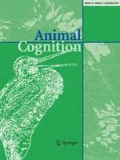Abstract
This study was aimed at the examination of ‘mental construction’ in paradise fish by interactive learning, which is suggested as an alternative hypothesis for backward or second-order conditioning. Avoidance of goldfish was established in paradise fish by presenting a harmless goldfish (a novel stimulus) after an aversive event (mild electric shocks) in the dark compartment of a shuttle tank. It was found that this avoidance depended on context pre-exposure. Experiment 1 was designed to study the effect of mild shocks on shuttling activity in a familiar context. Experiment 2 aimed at establishing fear-conditioning to the goldfish in a higher-order conditioning paradigm. In the course of training, unpaired stimuli were presented in the dark compartment of the shuttle tank in such a manner that the presentation of mild shocks (20 mA) preceded the encounter with a harmless fish (goldfish). Experiment 3 demonstrated the role of context pre-exposure in interactive learning. Results indicate that (1) while 60 mA shocks resulted in avoidance of the dark compartment, the 20 mA mild shocks affected exploratory behaviour; (2) after pre-exposure to the training environment, paradise fish avoided the dark compartment containing goldfish provided that subjects had previously encountered mild, explorative shocks there; (3) this conditioned fear, a ‘mental construction’ of a potential danger, was proved to be transferable to another context and was consequently aimed specifically at the goldfish, a living being, rather than the training context; (4) the pre-exposure to the shuttle tank was an important part of this training procedure, that is, only subjects habituated to the shuttle tank avoided the goldfish. Results are discussed in the framework of the Interactive Learning Hypothesis, which has been developed as an ethological approach to a higher-order conditioning paradigm.
Similar content being viewed by others
Author information
Authors and Affiliations
Additional information
Received: 15 January 1999 / Accepted after revision: 18 August 1999
Rights and permissions
About this article
Cite this article
Topál, J., Csányi, V. Interactive learning in the paradise fish (Macropodus opercularis): an ethological interpretation of the second-order conditioning paradigm. Anim Cogn 2, 197–206 (1999). https://doi.org/10.1007/s100710050040
Issue Date:
DOI: https://doi.org/10.1007/s100710050040



